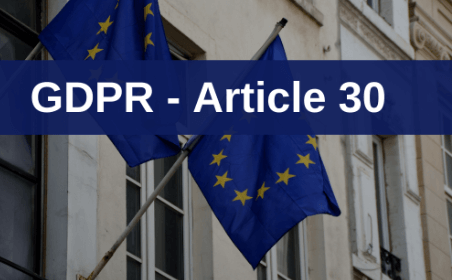The EU GDPR’s Article 30 Is What?

The EU General Data Protection Regulation (GDPR) Article 30 states, “requires organizations that process personal data to maintain a record of their processing activities.” Originally passed back in 2016, this regulation impacts every controller and processor of gdpr article 30 – regulated companies of personal data.
What Particular Specifications Are Needed?
Businesses have to document the data they handle and justify the reason for the processing. This document will include a description of the personal data categories as well as the ones of the data subjects. They also have to name other nations or foreign businesses receiving such personal data transfers and disclose the data receivers. Additionally maintained on file should be the identity and contact details of the controller gathering the data or any of their agents.
Records should, if at all feasible, show the intended time frame for deleting personal data records; nevertheless, while sensitive data is being maintained, they should also include a summary of security precautions being followed to guard that information if relevant. Furthermore, records have to be retained digitally as well as in writing; they should be ready and easily accessible upon demand to the supervisory authorities.
To Whom Does It Apply?
The GDPR specifies that only companies with 250 or more workers have to retain these records of processing operations (RoPA).
Like other regulations, there are exceptions; smaller businesses also have to follow Article 30 at times. One such exemption is should the processing should include “personal data relating to criminal convictions and offenses.” This new regulation will therefore be required of many smaller companies depending on it as well as other exclusions in order to avoid major fines.
See also: Choosing the Right SEO Agency: A Comprehensive Guide
For What Reason Is It Important?
Article 30 of GDPR has much more targeted restrictions and standards than any previous privacy law. Data privacy is not federally regulated in the United States; each state is left to handle things in that respect. With the California Consumer Privacy Act (CCPA), California boasts the legislation most akin to the GDPR. Signed into legislation in 2018, “its aim [was] to expand consumer privacy safeguards to the internet… Companies cannot sell customers’ personal data without first offering an online notice and a chance to opt-out. Such thorough data processing mandated by Article 30 and RoPA makes following other GDPR guidelines much simpler.
Conclusion
One facet of the record of processing activities is not data subject requests (DSRs). The rules and punishments apply not just to the information the data subject requests. Although it is not linked with a topic, keeping a RoPA is about GDPR compliance overall to prevent penalties. Protecting the data is still crucial so that negligence does not lead to breaches in other forms.